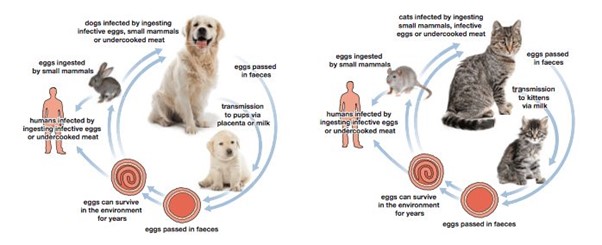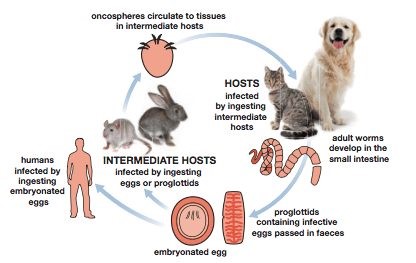Roundworms (Toxocara spp in dogs and cats)
Roundworms are present in virtually all puppies and kittens as they are passed from the mother, via the blood stream, before they are born and via the milk over the first few weeks of life. Even bitches or queens that have been wormed previously can have re-emergence of toxocara worms during pregnancy, and infect their offspring. The adults will usually not show any symptoms but the puppies may become ill, or pass worms in their faeces.
For this reason all puppies and kittens should be wormed every 2-3 weeks from 2-4 weeks of age with a good, safe wormer for their size. Severe roundworm infection in puppies and kittens can cause life threatening illness, due to the worms themselves causing obstructions etc., but also due to the passage of larval stages of the worms through their lungs and other organs during the normal life cycle of the worm.

Roundworms also commonly infect us! in the U.S. 13.9% of people had antibodies to Toxocara! While we will not develop “worms” when we become infected, there is a wide syndrome of problems that can be associated with exposure to Toxocara. The most well known syndrome is ocular larval migrans. This is a rare, but devastating, cause of blindness in children and is caused by damage to the eye when larval stages of toxocara migrate through the eye.
Visceral larval migrans can cause damage to any organ in the body, and has been associated with vague illness, epilepsy, asthma, and even cognitive development of children.
People become infected when they ingest “embryonated oocysts” These are found in the soil where dogs or cats have passed infected faeces. Oocysts, eggs, in the faeces need to develop for 2 weeks in the environment before they are infective. These oocysts have also been found on a significant number of dogs hair. This means that if your dog has roundworms in their intestines, they could be shedding oocysts and they could be on their coat, so anyone handling, or stroking them could potentially become infected if they then pass the oocysts into their mouth accidentally, e.g. while eating.
Studies have shown that worming 1-3 times per year makes very little difference to the worm burdens or risk of infection. Every 3 months is the minimum recommendation but as worms can start to pass eggs after 4-5 weeks then this too is not really often enough. Worming every 4 weeks will prevent oocysts.
Lungworm
Angiostrongylus vasorum (lungworm)
Lungworm in dogs has become much more widespread throughout the UK over the last few days. Dogs become infected if they eat infected slugs, snails or frogs. Lungworm can case all sorts of problems for dogs from sudden death to bleeding issues. Prevention is by treating with an appropriate wormer every 4 weeks.
Tapeworms
There are 3 main types of tapeworm

Dipylidium Caninum
These are transferred through fleas. If fleas are treated properly, dogs or cats will not have these tapeworms.
Taenia Species
Dogs and cats become infected by eating other infected hosts, e.g mice, rabbits, or raw infected meat. They do not generally cause health issues to our pets, or to us but they are most often seen in hunting cats. Tapeworm treatment every 4 weeks will prevent infection, or avoiding eating infected meat.
Echinococcus Granulosus and Multilocularis
These both cause serious illness in humans from contaminated food, or eating raw infected meat. E.multilocularis is not found in the UK but is prevalent throughout Europe. This is why the Pet Passport scheme still includes tapeworm treatment prior to re-entry into the UK by law. E. granulosus is not particularly prevalent in Northern Ireland or most of the UK except Wales. Avoiding raw meat and not hunting rodents, and treating every 4 weeks will prevent infection in high risk areas.
Heartworm - Dirofilaria
These are not found in the UK but cause disease in the warmer parts of Europe.
For more detailed information visit ESCCAP